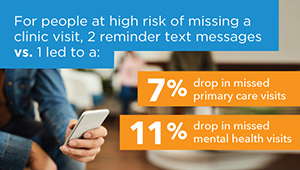Biostatistics
Research overview
High-quality health care research depends on high-quality biostatistics: Without it, conducting scientifically sound studies would be like trying to assemble a puzzle without having all the right pieces. The Biostatistics Unit at Kaiser Permanente Washington Health Research Institute promotes the use of rigorous statistical methods that enhance the quality of research at Kaiser Permanente Washington and nationwide.
National consortia
KPWHRI biostatisticians help lead several national consortia that are developing innovative methodological approaches to benefit public health, including the Food and Drug Administration (FDA)’s Sentinel Initiative. “We help the FDA overcome analytic challenges in using health care databases to conduct post-market safety surveillance, developing new methodological approaches that allow rapid safety surveillance of new medical products,” says Jennifer Nelson, PhD, director of biostatistics at KPWHRI.
Another such project is the National Institutes of Health (NIH)’s Health Care Systems Research Collaboratory, which supports several pragmatic clinical trials that take advantage of large health systems’ existing data resources to efficiently produce results that better reflect real-world care. Andrea Cook, PhD, and Jennifer Bobb, PhD, are developing new methods for these clinical trials that use data from electronic health records (EHRs) and other existing data systems. As Dr. Cook explains, “You need different methods and a whole new approach to trial design to test interventions that will work in a real-world setting.”
As a co-investigator on the Mental Health Research Network (MHRN), Susan Shortreed, PhD, helps design research ranging from comparative effectiveness and safety studies to predicting outcomes over time based on patient and provider characteristics and treatment choices. “Our long-term goal is to improve mental health care by using EHR data to identify which depression treatments will work best for which people,” she says.
Learning health care systems
KPWHRI biostatisticians also play an integral role in influential learning health system (LHS) research, which focuses on rapidly improving the delivery of health care using feedback from patients, community members, providers, and health system leadership. As an Agency for Healthcare Research and Quality (AHRQ)/Patient-Centered Outcomes Research Institute (PCORI)-funded LHS scholar, R. Yates Coley, PhD, provides risk prediction expertise to KPWHRI’s LHS Program, using data from a person’s health history, diseases, treatments, and other information to predict, in an automated manner, who is at higher risk for prostate cancer as well as who will respond well to treatment for depression.
Seattle Symposium
With the use of EHR data for research rising, methodological rigor is more important than ever. That’s why Drs. Cook and Nelson joined with Patrick Heagerty, PhD, a KPWHRI affiliate investigator and professor of biostatistics at the University of Washington, to launch the Seattle Symposium on Health Care Data Analytics. Held in 2014, 2016, and 2018, this first-of-its-kind event brought together scientists from across the country to discuss the statistical challenges of using EHR data for health research and to explore new methods to overcome those challenges.
Through the symposium and the many ongoing projects at KPWHRI, our biostatisticians continue to improve the rigor with which scientists address important questions about public health and health services. “We have an incredibly strong group, including many very talented master’s-level statisticians who help apply and adapt statistical methods to real-world situations—an asset that is rare in most academic research settings,” Dr. Nelson says.
Recent publications on Biostatistics
Xu S, Zeng C, Newcomer S, Nelson JC, Glanz J. Use of fixed effects models to analyze self-controlled case series data in vaccine safety studies. J Biom Biostat. 2012 Apr 19;Suppl 7:006. PubMed
Mahajan K, Coppola D, Chen YA, Zhu W, Lawrence HR, Lawrence NJ, Mahajan NP. Ack1 tyrosine kinase activation correlates with pancreatic cancer progression. Am J Pathol. 2012 Apr;180(4):1386-93. doi: 10.1016/j.ajpath.2011.12.028. Epub 2012 Feb 7. PubMed
Cook AJ, Tiwari RC, Wellman RD, Heckbert SR, Li L, Heagerty P, Marsh T, Nelson JC. Statistical approaches to group sequential monitoring of postmarket safety surveillance data: current state of the art for use in the Mini-Sentinel pilot. Pharmacoepidemiol Drug Saf. 2012;21 Suppl 1:72-81. doi: 10.1002/pds.2320. PubMed
Finkelstein S, Trotti A, Rao N, Reintgen D, Cruse W, Feun L, Sondak V, Yu D, Zhu W, Gwede C, DeConti R. The Florida Melanoma Trial I: a prospective multicenter phase I/II trial of postoperative hypofractionated adjuvant radiotherapy with concurrent interferon-alfa-2b in the treatment of advanced stage III melanoma with long-term toxicity follow-up. ISRN Immunology. 2012;2012:[10 p.]. doi:10.5402/2012/324235. PubMed
Wong ES, Wang BC, Garrison LP, Alfonso-Cristancho R, Flum DR, Arterburn DE, Sullivan SD. Examining the BMI-mortality relationship using fractional polynomials. BMC Med Res Methodol. 2011 Dec 28;11(1):175. PubMed
Researchers in Biostatistics
 Jennifer F. Bobb, PhDAssociate Biostatistics Investigator |
 Yates Coley, PhDAssociate Biostatistics Investigator |
 Andrea J. Cook, PhDSenior Biostatistics Investigator |
 Maricela Cruz, PhDAssistant Biostatistics Investigator |
 Noorie Hyun, PhDAssociate Biostatistics Investigator |
 Jennifer C. Nelson, PhDDirector, Biostatistics; Senior Investigator |
 Pamela A. Shaw, PhD, MSSenior Biostatistics Investigator |
 Susan M. Shortreed, PhDSenior Biostatistics Investigator |
 Yu-Ru Su, PhDAssociate Biostatistics Investigator |
 Brian D. Williamson, PhDAssistant Biostatistics Investigator |
 Melissa L. Anderson, MSPrincipal Collaborative Biostatistician |
 Laura E. Ichikawa, MSPrincipal Collaborative Biostatistician |
 Abisola Idu, MS, MPHCollaborative Biostatistician |
 Eric Johnson, MSSenior Collaborative Biostatistician |
 Chloe Krakauer, PhDCollaborative Biostatistician |
 Rod L. Walker, MSPrincipal Collaborative Biostatistician |
 Robert D. Wellman, MSPrincipal Collaborative Biostatistician |
 Onchee Yu, MSPrincipal Collaborative Biostatistician |
 Weiwei Zhu, MSSenior Collaborative Biostatistician |















